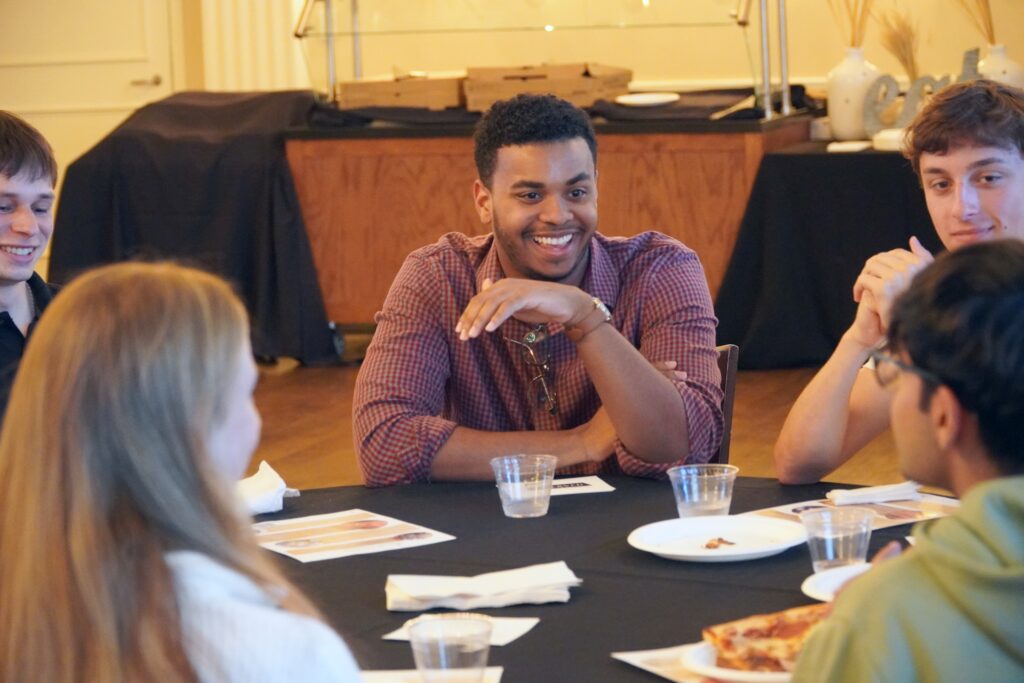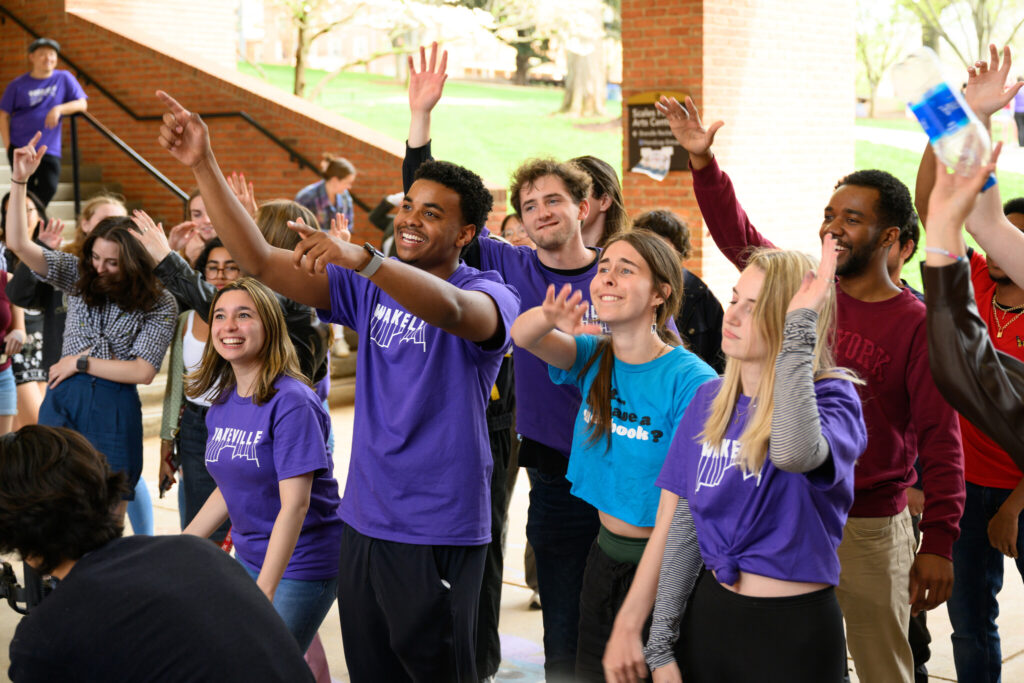A Good Fellow
Roscoe Bell (’23) came to our Program as a student. That led to a fellowship and then a staff position, and soon it’ll lead him in a new direction at Wake Forest. All along the way, he has seen connections that others don’t and used those connections to bring people together.

Every Wednesday Night Dinner starts off the same. Students arrive. They grab a plate of food, and have a seat at the large conference table in Starling Hall. They share their name, intended major, and a moment of gratitude, hope, and courage. Then, they talk.
Where it goes from there depends on the students who show up. Or the mood. The questions and answers can get deep. The discussion is never quite the same.
The constant, so far, has been Roscoe Bell. He gets there before anyone else. He’s there at 5:00 when the food is delivered. He runs over his presentation before students arrive. He sets the tone by turning on music and pulling in extra chairs. Bell knows what it’s like to be a student at a time like this. Not too long ago, he was in their shoes. Now, he’s the Program Coordinator for the Program for Leadership and Character, helping other students with the questions that he once had. He loves creating communities big and small, and he’s always felt an urge to bring people together for the Program and beyond. “When I don’t feel a connection,” he says, “I feel drawn to create it.”
As a six-year-old in Jacksonville, Florida, Roscoe Bell planned a Christmas party for his family. He made cookies, and read them a book. Later, he played computer games in his free time. At 15, he started several video game leagues that grew to include hundreds of teams and thousands of players. From this, Bell learned how to effectively plan, organize, and facilitate engagement.
Nobody in his family had attended college, but Bell knew he wanted to go. During a college counseling course, the class played a word association game. They were given numbers and descriptions of colleges and universities without knowing their names. One institution stuck out: A small, liberal arts school with a few thousand students. There were a lot of bricks. A tight-knit community. Students had close relationships with professors. Bell didn’t know the name of this university, but he knew it sounded like the place for him.
That place was Wake Forest University.
Bell enrolled two years later to follow a pre-med track, eventually majoring in psychology and minoring in music. “I grew up on music, belting out songs in the car that only my mother and brother could sing,” he says. “I could not, but I tried. I just loved music and the way it connected us.” He even began to teach himself how to play the piano in between classes.
Still, something was missing from Wake Forest’s arts scene. “I felt like music students didn’t know dance students, dance students didn’t know theatre students, and theatre students didn’t know visual arts students,” he says. Other students told him they felt the same way. So Bell pitched an idea to the chair of the music department: A student-led, interdisciplinary arts festival that would showcase a variety of talent and creativity across campus. He then put together a committee of student artists from across campus. That idea became Wakeville, which debuted in 2023 with help from a committee of 50 students and 70 volunteers. “I loved the idea of celebrating the arts on one day, bringing this community together, and being with one another,” Bell says.
“When I don’t feel a connection, I feel drawn to create it.”
Roscoe Bell (’23)
Bell led the event along with Gretchen Castelloe (‘23). “The two of us really balanced each other out,” she says. “Roscoe is such a visionary and dreamer.” And he was a doer. During that first Wakeville in 2023, some 100 student artists took part, and more than 1,000 students attended. “I think that he really showed me that I’m capable of a lot more than I thought,” says Castelloe, “especially when we were working together with other people.”

Bell didn’t find the Program for Leadership and Character until his junior year. In April 2022, he met Director of Programming Ann Phelps at a book launch that doubled as an opportunity to showcase the various arts programming on campus. Afterward, Bell introduced himself to the other students. He mentioned Wakeville as well as Songbird Musical Service, a student organization he also helped to create that offers music therapy to dementia and Alzheimer’s patients. Phelps noticed something. “I just thought that this is a person who is really curious about how their talents and capacities can be of service to the world,” she says.
During his last year at Wake Forest, Bell became a regular with the Program, showing up for discussion groups and regular events. After graduation in spring 2023, he wasn’t quite ready to leave. He became a Program fellow, which led to a conversation with Michael Lamb. “I will never forget the first meeting I had with Michael,” says Bell. “It genuinely changed my life.” Lamb, the Program’s executive director, encouraged Bell to do things that he aligned with. To live with the questions. To understand what it means to be whole. To begin to ask his own questions, instead of harping on the questions he felt others were pressing and asking of him.
The conversation guided him in his new role. Not long after students returned to campus that fall, Bell had a new idea to get them more connected, this time over food and conversation. Wednesday Night Dinners at Starling Hall soon became a space for students to gather and have meaningful conversation over a meal.
The topic of the last dinner for 2024? Love. After the students discuss five open-ended questions with the person next to them, they come back together to reflect as a group. Bell tells the group that they show the same love to themselves like they would show for others. He wants to start conversations that keep going. “I think leaving students with questions and allowing their own autonomous minds to try and assess those, either consciously or unconsciously in their own spaces, is much better than trying to deliver a message and give a statement by the end,” he says.
After his fellowship ended, Bell continued his work as a Program Coordinator, and helped to rethink what it means to be a student ambassador, creating a workbook with Assistant Director of Programming Jazz Logan. He’s also helped to increase the Program’s visibility on campus and online, often thinking of ideas that might help explain character through social media. “His natural ability to connect with students and make them feel comfortable has meant that we’ve been able to really broaden our reach into the student population,” says Phelps.
Bell’s time as a staff member with the Program will come to an end this year, but he’s not going far. He’ll attend the Wake Forest University School of Medicine in July 2025. He knows there are new challenges ahead, but he’s looking forward to a life of service, learning, and new connections. “It’s just about remembering that when failure happens it’s okay, and the only way you can really do that is seeing the bigger picture or the bigger story,” he says. “And I’ve learned that story. I have learned who I am here at Wake.”
